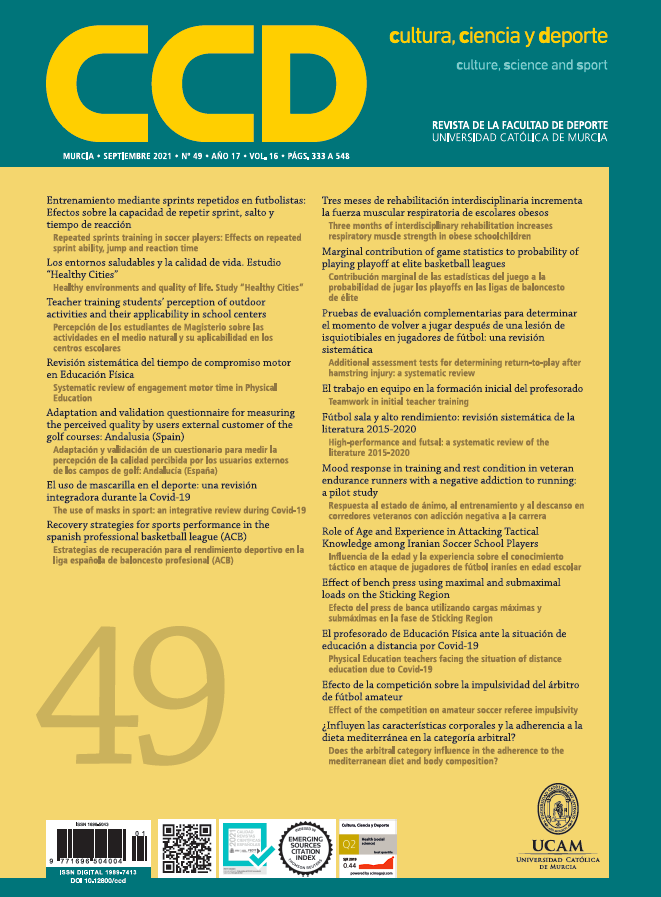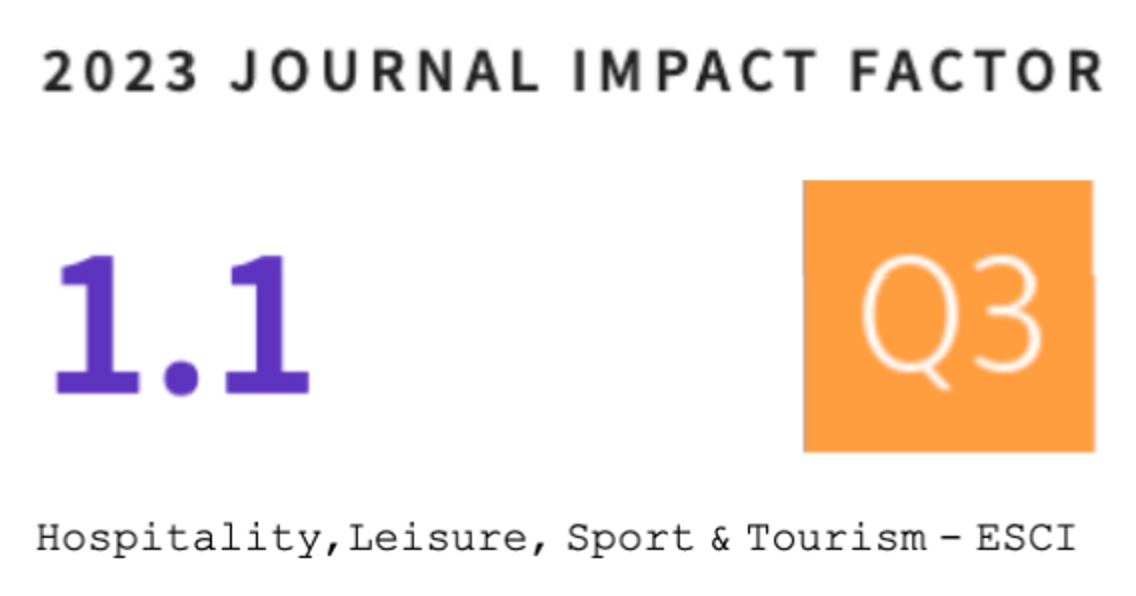Los entornos saludables y la calidad de vida. Estudio “Healthy Cities”
DOI:
https://doi.org/10.12800/ccd.v16i49.1680Palabras clave:
Objetivos de desarrollo sostenible (Sustainable development goals), Actividad física (Physical activity), Dieta mediterránea (Mediterranean diet), Movilidad sostenible (Sustainable mobility), Entorno laboral (Work environmentResumen
Este estudio se basa en el proyecto Healthy Cities (Sanitas) sobre el estudio de entornos saludables en ambientes laborales. El objetivo de este fue conocer los perfiles de actividad física, nutri cionales, nivel de felicidad y de somnolencia de los trabajadores de las empresas participantes. Se diseñó un estudio observacional, descriptivo y transversal, con una muestra de 2491 sujetos. Como herramientas se utilizaron el International Physical Activity Questionnaire, el nivel de adherencia a la dieta mediterránea del proyecto PREDIMED, el índice de felicidad de Pemberton y la escala de somnolencia de Epworth. El análisis estadístico se realizó mediante el test de chi cuadrado para la diferencia de proporciones en las categorías de las variables de estudio, y la prueba t de Student para muestras independientes para comparar los valores de la variable percepción de felicidad. El nivel de significación establecido fue de p<.05 para todas las pruebas. Los datos muestran niveles altos de sedentarismo (64.7%), al igual que niveles de actividad física recomendados bajos (56.6%) y nieles medios de adherencia a dieta mediterránea (46.8%). Sin embargo, los niveles de felicidad percibida (M=7.55) y somnolencia normal (73%) son mejores. Se concluye la importancia de una promoción de hábitos saludables en entornos laborales.
Citas
Ahmad, S., Demler, O. V., Sun, Q., Moorthy, M. V., Li, C., Lee, I. M., Ridker, P. M., Manson, J. E., Hu, F. B., Fall, T., Chasman, D. I., Cheng, S., Pradhan, A., & Mora, S. (2020). Association of the Mediterranean Diet With Onset of Diabetes in the Women's Health Study. JAMA Netw Open, 3(11), e2025466. https://doi.org/10.1001/jamanetworkopen.2020.25466
Aizer, A., Gaziano, J. M., Cook, N. R., Manson, J. E., Buring, J. E., & Albert, C. M. (2009). Relation of vigorous exercise to risk of atrial fibrillation. Am J Cardiol, 103(11), 1572-1577. https://doi.org/10.1016/j.amjcard.2009.01.374
Alvarez-Pitti, J., Casajús Mallén, J. A., Leis Trabazo, R., Lucía, A., López de Lara, D., Moreno Aznar, L. A., & Rodríguez Martínez, G. (2020). Ejercicio físico como «medicina» en enfermedades crónicas durante la infancia y la adolescencia. [Exercise as medicine in chronic diseases during childhood and adolescence]. An Pediatr (Barc), 92(3), 173.e171-173.e178. https://doi.org/10.1016/j.anpedi.2020.01.010
Brisson, C., Larocque, B., Moisan, J., Vézina, M., & Dagenais, G. R. (2000). Psychosocial factors at work, smoking, sedentary behavior, and body mass index: a prevalence study among 6995 white collar workers. J Occup Environ Med, 42(1), 40-46. https://doi.org/10.1097/00043764-200001000-00011
Craig, C. L., Marshall, A. L., Sjöström, M., Bauman, A. E., Booth, M. L., Ainsworth, B. E., Pratt, M., Ekelund, U., Yngve, A., Sallis, J. F., & Oja, P. (2003). International physical activity questionnaire: 12-country reliability and validity. Med Sci Sports Exerc, 35(8), 1381-1395. https://doi.org/10.1249/01.Mss.0000078924.61453.Fb
De Luis, D. A., López Mongil, R., Gonzalez Sagrado, M., Lopez Trigo, J. A., Mora, P. F., & Castrodeza Sanz, J. (2011). Nutritional status in a multicenter study among institutionalized patients in Spain. Eur Rev Med Pharmacol Sci, 15(3), 259-265.
Dickinson, D. L., Wolkow, A. P., Rajaratnam, S. M. W., & Drummond, S. P. A. (2018). Personal sleep debt and daytime sleepiness mediate the relationship between sleep and mental health outcomes in young adults. Depress Anxiety, 35(8), 775-783. https://doi.org/10.1002/da.22769
Esfahani, B. N., Kolahdouzan, M., Aflakseir, A., & Gharipour, M. (2017). Predicting body mass index in women: The value of the psychological components of depression, anxiety, dietary restraint, and nutritional habits. J Educ Health Promot, 6, 9. https://doi.org/10.4103/jehp.jehp_247_13
Estruch, R., Ros, E., Salas-Salvadó, J., Covas, M. I., Corella, D., Arós, F., Gómez-Gracia, E., Ruiz-Gutiérrez, V., Fiol, M., Lapetra, J., Lamuela-Raventos, R. M., Serra-Majem, L., Pintó, X., Basora, J., Muñoz, M. A., Sorlí, J. V., Martínez, J. A., Fitó, M., Gea, A., Hernán, M. A., & Martínez-González, M. A. (2018). Primary Prevention of Cardiovascular Disease with a Mediterranean Diet Supplemented with Extra-Virgin Olive Oil or Nuts. N Engl J Med, 378(25), e34. https://doi.org/10.1056/NEJMoa1800389
García-García, J. A., Reding-Bernal, A., & López-Alvarenga, J. C. (2013). Cálculo del tamaño de la muestra en investigación en educación médica [10.1016/S2007-5057(13)72715-7]. Investigación en Educación Médica, 2(8), 217-224. https://doi.org/10.1016/S2007-5057(13)72715-7
Gisbert, F. J. G., Martínez, E. R., Pérez, C. A., & Domínguez, J. C. R. (2020). Las áreas urbanas funcionales en España: Economía y calidad de vida. Fundacion BBVA.
González, K., Fuentes, J., & Márquez, J. L. (2017). Physical Inactivity, Sedentary Behavior and Chronic Diseases. Korean J Fam Med, 38(3), 111-115. https://doi.org/10.4082/kjfm.2017.38.3.111
Haskell, W. L., Lee, I. M., Pate, R. R., Powell, K. E., Blair, S. N., Franklin, B. A., Macera, C. A., Heath, G. W., Thompson, P. D., & Bauman, A. (2007). Physical activity and public health: updated recommendation for adults from the American College of Sports Medicine and the American Heart Association. Med Sci Sports Exerc, 39(8), 1423-1434. https://doi.org/10.1249/mss.0b013e3180616b27
Hervás, G., & Vázquez, C. (2013). Construction and validation of a measure of integrative well-being in seven languages: the Pemberton Happiness Index. Health Qual Life Outcomes, 11, 66. https://doi.org/10.1186/1477-7525-11-66
Johns, M. W. (1991). A new method for measuring daytime sleepiness: the Epworth sleepiness scale. Sleep, 14(6), 540-545. https://doi.org/10.1093/sleep/14.6.540
Juarez, F. (2011). The concept of health: an explanation of its uniqueness, multiplicity and health models. International Journal of Psychological Research, 4(1), 70-79. https://doi.org/10.21500/20112084.801
Karimi, S. M., Maziyaki, A., Ahmadian Moghadam, S., Jafarkhani, M., Zarei, H., Moradi-Lakeh, M., & Pouran, H. (2020). Continuous exposure to ambient air pollution and chronic diseases: prevalence, burden, and economic costs. Rev Environ Health. https://doi.org/10.1515/reveh-2019-0106
Kim, D., Vazquez-Montesino, L. M., Li, A. A., Cholankeril, G., & Ahmed, A. (2020). Inadequate Physical Activity and Sedentary Behavior Are Independent Predictors of Nonalcoholic Fatty Liver Disease. Hepatology, 72(5), 1556-1568. https://doi.org/10.1002/hep.31158
Kogo, T., Tsujikawa, M., Kiuchi, Y., Nishino, A., & Hashimoto, S. (2019). Model Predictive Control of Shallow Drowsiness: Improving Productivity of Office Workers. Annu Int Conf IEEE Eng Med Biol Soc, 2019, 2459-2465. https://doi.org/10.1109/embc.2019.8856562
Ku, P. W., Steptoe, A., Liao, Y., Hsueh, M. C., & Chen, L. J. (2018). A cut-off of daily sedentary time and all-cause mortality in adults: a meta-regression analysis involving more than 1 million participants. BMC Med, 16(1), 74. https://doi.org/10.1186/s12916-018-1062-2
Kyu, H. H., Bachman, V. F., Alexander, L. T., Mumford, J. E., Afshin, A., Estep, K., Veerman, J. L., Delwiche, K., Iannarone, M. L., Moyer, M. L., Cercy, K., Vos, T., Murray, C. J., & Forouzanfar, M. H. (2016). Physical activity and risk of breast cancer, colon cancer, diabetes, ischemic heart disease, and ischemic stroke events: systematic review and dose-response meta-analysis for the Global Burden of Disease Study 2013. Bmj, 354, i3857. https://doi.org/10.1136/bmj.i3857
Leitaru, N., Kremers, S., Hagberg, J., Björklund, C., & Kwak, L. (2019). Associations Between Job-Strain, Physical Activity, Health Status, and Sleep Quality Among Swedish Municipality Workers. J Occup Environ Med, 61(2), e56-e60. https://doi.org/10.1097/jom.0000000000001516
Liang, Y., Horrey, W. J., Howard, M. E., Lee, M. L., Anderson, C., Shreeve, M. S., O'Brien, C. S., & Czeisler, C. A. (2019). Prediction of drowsiness events in night shift workers during morning driving. Accid Anal Prev, 126, 105-114. https://doi.org/10.1016/j.aap.2017.11.004
Lin, C. Y., Koohsari, M. J., Liao, Y., Ishii, K., Shibata, A., Nakaya, T., McCormack, G. R., Hadgraft, N., Owen, N., & Oka, K. (2020). Workplace neighbourhood built environment and workers' physically-active and sedentary behaviour: a systematic review of observational studies. Int J Behav Nutr Phys Act, 17(1), 148. https://doi.org/10.1186/s12966-020-01055-x
Mancuso, T. F. (1960). The relationship of the occupational environment to chronic diseases. Ind Med Surg, 29, 169-172.
Martín, M., Barriopedro, M. I., Martínez del Castillo, J., Jiménez-Beatty, J. E., & Rivero-Herráiz, A. (2014). Diferencias de género en los hábitos de actividad física de la población adulta en la Comunidad de Madrid. Ricyde, 10(38), 319-335. https://doi.org/10.5232/ricyde2014.03803
Mendes, M. A., da Silva, I., Ramires, V., Reichert, F., Martins, R., Ferreira, R., & Tomasi, E. (2018). Metabolic equivalent of task (METs) thresholds as an indicator of physical activity intensity. PLoS One, 13(7), e0200701. https://doi.org/10.1371/journal.pone.0200701
Mielke, G. I., Bailey, T. G., Burton, N. W., & Brown, W. J. (2020). Participation in sports/recreational activities and incidence of hypertension, diabetes, and obesity in adults. Scand J Med Sci Sports. https://doi.org/10.1111/sms.13795
Ministerio de Empleo y Seguridad Social. (2015). Estrategia española de responsabilidad social de las empresas. Ministerio de Empleo y Seguridad Social. http://www.mites.gob.es/ficheros/rse/documentos/eerse/EERSE-Castellano-web.pdf
Nazarov, S., Manuwald, U., Leonardi, M., Silvaggi, F., Foucaud, J., Lamore, K., Guastafierro, E., Scaratti, C., Lindström, J., & Rothe, U. (2019). Chronic Diseases and Employment: Which Interventions Support the Maintenance of Work and Return to Work among Workers with Chronic Illnesses? A Systematic Review. International journal of environmental research and public health, 16(10). https://doi.org/10.3390/ijerph16101864
Nicolás, J. D., & de Espinosa, E. L. (2018). La globalización: el proceso de expansión de los sistemas sociales : sesión del día 27 de febrero de 2018. Real Academia de Ciencias Morales y Políticas.
Organización Mundial de la Salud. (1948). Constitución de la Organización Mundial de la Salud. http://apps.who.int/gb/bd/PDF/bd48/basic-documents-48th-edition-sp.pdf?ua=1#page=7
Pineault, R., Borgès Da Silva, R., Provost, S., Breton, M., Tousignant, P., Fournier, M., Prud'homme, A., & Levesque, J. F. (2016). Evolution of Experience of Care of Patients with and without Chronic Diseases following a Québec Primary Healthcare Reform. Int J Chronic Dis, 2016, 2497637. https://doi.org/10.1155/2016/2497637
Pizzi, M. A., & Richards, L. G. (2017). Promoting Health, Well-Being, and Quality of Life in Occupational Therapy: A Commitment to a Paradigm Shift for the Next 100 Years. Am J Occup Ther, 71(4), 7104170010p7104170011-7104170010p7104170015. https://doi.org/10.5014/ajot.2017.028456
Queiroz, D. C., Turi, B. C., Sarti, F. M., Dos Santos Ferro, I., de Morais, L. C., & Sanches Codogno, J. (2020). Association between quality of life, physical activity, use of medication and costs of treatment for chronic diseases in Primary Care. J Sports Med Phys Fitness, 60(3), 456-463. https://doi.org/10.23736/s0022-4707.19.10170-3
Rodas, L., Riera-Sampol, A., Aguilo, A., Martínez, S., & Tauler, P. (2020). Effects of Habitual Caffeine Intake, Physical Activity Levels, and Sedentary Behavior on the Inflammatory Status in a Healthy Population. Nutrients, 12(8). https://doi.org/10.3390/nu12082325
Sanitas. (2020). Healthy Cities. https://corporativo.sanitas.es/sobre-nosotros/sostenibilidad/healthy-cities/
Schultz, N. S., Chui, K. K. H., Economos, C. D., Lichtenstein, A. H., Volpe, S. L., & Sacheck, J. M. (2020). Impact of physical activity, diet quality and stress on cardiometabolic health in school employees. Prev Med Rep, 20, 101243. https://doi.org/10.1016/j.pmedr.2020.101243
Tereza-Araujo, A., & Dosil, J. (2016). Relaciones entre actitudes y práctica de actividad física y deporte en hombres y mujeres. Cuadernos de Psicología del Deporte, 16(3), 67-72. https://revistas.um.es/cpd/article/view/278441
Time to revise the Sustainable Development Goals. (2020). Nature, 583(7816), 331-332. https://doi.org/10.1038/d41586-020-02002-3
Waterland, J. L., Edbrooke, L., Appathurai, A., Lawrance, N., Temple-Smith, M., & Denehy, L. (2020). 'Probably better than any medication we can give you': General practitioners' views on exercise and nutrition in cancer. Aust J Gen Pract, 49(8), 513-518. https://doi.org/10.31128/ajgp-12-19-5176
Descargas
Publicado
Versiones
- 2021-09-08 (2)
- 2021-09-06 (1)
Cómo citar
Número
Sección
Licencia
Derechos de autor 2021 Creative Commons Attribution License

Esta obra está bajo una licencia internacional Creative Commons Atribución-NoComercial-CompartirIgual 4.0.
Los autores que publican en esta revista están de acuerdo con los siguientes términos:- Los autores conservan los derechos de autor y garantizan a la revista el derecho de ser la primera publicación del trabajo al igual que licenciado bajo una Creative Commons Attribution License que permite a otros compartir el trabajo con un reconocimiento de la autoría del trabajo y la publicación inicial en esta revista.














